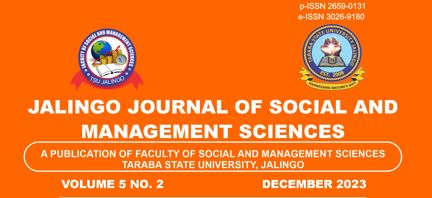Intelligence, Financial Crimes Commission and War against Cybercrime among Youths in the Federal Capital Territory in Nigeria
Keywords:
Cybercrime, intelligence, youth, financial crimes commissionAbstract
Without any tittle of doubt, the proliferation of digital technologies has brought about unprecedented opportunities for connectivity and innovation, but it has also given rise to a surge in cybercrime, particularly among the youth population, despite the efforts of the Economic and Financial Crimes Commission (EFCC) to combat this menace in Nigeria. This study assesses the impact of EFCC intelligence operations on cybercrime in the Federal Capital Territory (FCT) of Abuja, Nigeria. The study derives its data from primary and secondary sources. One hundred and fifty (150) questionnaires were administered and were returned valid for the analysis. The collected data were analyzed through statistical methods. A major finding in this study revealed a significant concern among the public regarding the potential consequences of cybercrime on Nigeria's national security. And also, findings of the study reveals that well-executed intelligence operations enhance the efficiency of cybercrime investigations, aiding in the identification and apprehension of cybercriminals. Efforts have been made to curb the menace, but they seem unproductive when compared to the degree of the menace. To this effect, this study recommends, among others, that there is a need for the government, in liaison with the EFCC, to develop strategies to reduce or possibly curb cybercrime in order to be proactive and reactive. There is a need for more analytical, technical, or technological capabilities in order to curb cybercrime and be able to detect and analyze cyberattacks. It is important for the nation to rebrand its image; there should be vigorous inter-agency synergy, cooperation, coordination, and collaboration among law enforcement agencies instead of competition in order to ensure national security.

Downloads
Published
Issue
Section
License
Copyright (c) 2023 JALINGO JOURNAL OF SOCIAL AND MANAGEMENT SCIENCES

This work is licensed under a Creative Commons Attribution-NonCommercial 4.0 International License.
